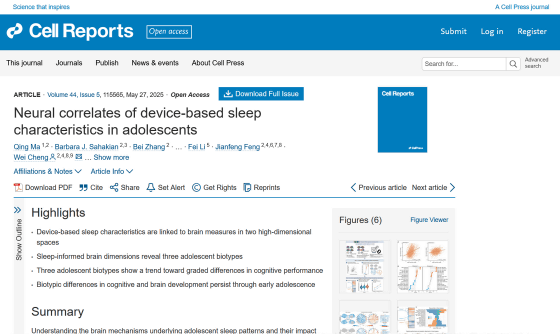Just 15 minutes more sleep could benefit adolescent brains

Sleep is necessary for the human body to function well, and it helps improve immunity and mental health, while the brain flushes out toxins and waste products that build up during sleep, and strengthens memory. A new study of more than 3,000 children showed that just 15 minutes more sleep can improve children's brain function.
Neural correlates of device-based sleep characteristics in adolescents: Cell Reports

Adolescents who sleep longer perform better at cognitive tasks | University of Cambridge
https://www.cam.ac.uk/research/news/adolescents-who-sleep-longer-perform-better-at-cognitive-tasks
Just 15 Extra Minutes of Sleep Is Linked to Brain Benefits in Young People : ScienceAlert
https://www.sciencealert.com/just-15-extra-minutes-of-sleep-is-linked-to-brain-benefits-in-young-people
Getting enough sleep is important for mental and physical health, but people's sleep patterns change dramatically during adolescence, between the ages of 11 and 18, when they tend to go to bed later and get less sleep overall. According to the American Academy of Sleep Medicine, the ideal amount of sleep for this age group is about 8 to 10 hours, but many kids don't sleep that long.
Barbara Sahakian , professor of psychiatry at the University of Cambridge, said: 'Getting regular, good-quality sleep is important for us to function properly. But while we know a lot about sleep in adulthood and beyond, we know surprisingly little about sleep during adolescence, despite it being such a crucial period in our development. For example, how much sleep do young people get, and how does this affect brain function and cognitive ability?'
Of course, there are studies that look at how much adolescents sleep, but the results generally rely on children's self-reporting, which may not accurately reflect how much sleep they get, so Sahakian and his team turned to data from the Adolescent Brain and Cognitive Development (ABCD) study , conducted in the United States.
As part of the study, the researchers gave more than 3,200 11- to 12-year-olds a Fitbit health tracker to collect objective data on their sleep patterns, and were able to follow up with about 1,190 participants at age 13 to 14 to reaffirm the results.

As a result of the analysis, the children were divided into three groups based on their sleep patterns. 'Biotype 1,' which accounted for about 39% of the subjects, fell asleep the latest and woke up the earliest, with an average sleep time of 7 hours and 10 minutes. 'Biotype 2,' which accounted for 24% of the subjects, was at an average level across all sleep characteristics, with an average sleep time of 7 hours and 21 minutes. 'Biotype 3,' which accounted for 37% of the subjects, tended to go to bed the earliest and had the lowest heart rate while sleeping, with an average sleep time of 7 hours and 25 minutes.
There was no significant difference in academic performance among the three biotypes, but in cognitive tests measuring vocabulary, reading comprehension, problem-solving, and concentration, biotype 3 performed best, followed by biotype 2, and biotype 1 performed worst.
Additionally, children with biotype 3 had the largest brain volume and best brain function, while children with biotype 1 had the smallest brain volume and poorest brain function.
'The difference in the amount of sleep each group got was relatively small - just over 15 minutes between the best and worst sleepers - but we still saw differences in brain structure and activity, and in how they performed tasks,' Sahakian said. 'This tells us how important it is to get good quality sleep at such a critical time in our lives.'

Related Posts:
in Science, Posted by log1h_ik







